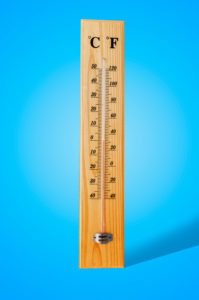Understanding Heating and Cooling Degree Days and How They Affect Your Home Comfort
 Looking to maintain that perfect level of comfort in your home without getting blindsided by a massive bill from an unusually cold winter or hot summer day? For NJ homeowners and businesses, understanding heating and cooling degree days could be the answer. Looking at degree-day data can make it easier to anticipate future energy usage needs and costs, and to select the right high-efficiency HVAC equipment to best maintain year-round comfort.
Looking to maintain that perfect level of comfort in your home without getting blindsided by a massive bill from an unusually cold winter or hot summer day? For NJ homeowners and businesses, understanding heating and cooling degree days could be the answer. Looking at degree-day data can make it easier to anticipate future energy usage needs and costs, and to select the right high-efficiency HVAC equipment to best maintain year-round comfort.
But what does degree-day data mean and how does it affect home comfort? Let’s take a look.
What is Degree Days?
Contents
The National Weather Service (NWS) keeps track of degree days. It’s a term that directly refers to how much heating or cooling can maintain a certain comfort level. The baseline temperature set by the NWS is 65 degrees Fahrenheit. Although it’s different for each home or office, it’s the temperature where no heating or cooling is necessary.
How Do I Calculate Heating and Cooling Degree Days?
To simplify a somewhat complex calculation, average the difference between the high and low temperatures and subtract it from 65.
For example, if it was 50 degrees F outside for half of the day and 30 degrees outside for half of the day, add half of the difference between 50 and 65 (7.5) to half the difference between 30 and 65 (17.5), to get to your heating degree day number of 25. Cooling degree day calculations use a similar process (daily average temperature – base temperature).
At Point Bay, we add the high and low temperatures of the day together then divide by two and subtract sixty-five from the quotient to establish a standard to account for fluctuating NJ temperatures.
The calculation is much more complex in reality. Using the above example will give those looking to use degree-day data a general idea of how to get a jump on maintenance scheduling or to plan out a purchase for a new furnace or air conditioner.
How Can I Use Degree-Day Data?
For homeowners or businesses, degree-day data can predict heating and cooling trends so you can determine whether your energy consumption is the result of weather fluctuations or caused by other factors such as faulty equipment. It can also measure the efficiencies of your HVAC or help identify other cost-saving measures that can be implemented in an effort to lower bills.
Where Can I Find Degree-Day Data?
Visit degreedays.net to identify a weather station near you. Select a base temperature and get your degree-day calculation based on the period of time you want to examine.
Degree-day data helps us anticipate our customers’ demands and enables us to create appropriate pricing schedules. To learn more about degree days, visit our FAQ page and blog for more information.
Reliable Heating and Cooling Services in NJ
Our service technicians are available 24/7 for all of your heating or cooling emergencies. From annual tune-ups to complete replacement, Point Bay’s team of professional technicians is ready to assist with your home comfort needs. Give us a call at (732) 349-5059 today.
